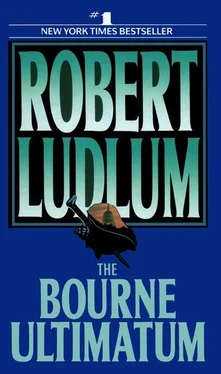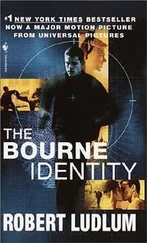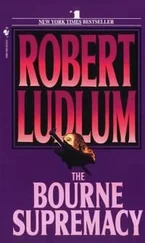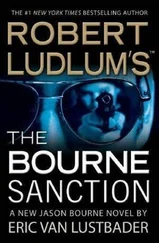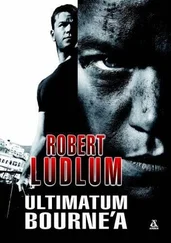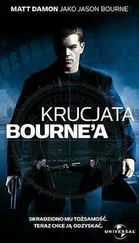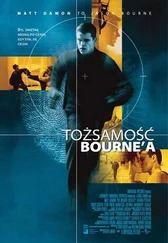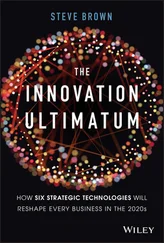Bourne rose to his feet and stumbled out of the brush into the path, the Uzi in his hands; the victory was his, his freedom his, his family his! As the robed figure reached the top of the primitive rock-hewn staircase, Jason pressed his trigger finger, holding it in place, the fusillade of bullets exploding out of the automatic weapon.
The monk arched in silhouette, then fell, his body tumbling, rolling, sprawling down the steps carved out of volcanic rock, finally lurching over the edge and plummeting to the sand below. Bourne raced down the awkward, irregular stone staircase, the two commandos behind him. He reached the beach, raced over to the corpse, and pulled the drenched hood away from the face. In horror, he looked at the black features of Samuel, the brother priest of Tranquility Isle, the Judas who had sold his soul to the Jackal for thirty pieces of silver.
Suddenly, in the distance, there was the roar of powerful dual engines as a huge speedboat lurched out of a shadowed section of the cove and sped for a break in the reefs. The beam of a searchlight shot out, firing the barriers of rock protruding above the choppy black water, its wash illuminating the fluttering ensign of the government's drug fleet. Carlos! ... The Jackal was no chameleon, but he had changed! He had aged, grown thinner and bald-he was not the sharp, broad, full-headed muscular image of Jason's memory. Only the indistinct dark Latin features remained, the face and the unfamiliar expanse of bare skin above burned by the sun. He was gone!
The boat's motors screamed in unison as the craft breached a precarious opening in the reef and burst out into open water. Then the words in heavily accented English, metallically spewing from the distant loudspeaker, echoed within the tropical cove.
"Paris, Jason Bourne! Paris, if you dare! Or shall it be a certain minor university in Maine, Dr. Webb?"
Bourne, his neck wound ripped open, collapsed in the lapping waves, his blood trickling into the sea.
Steven DeSole, keeper of the deepest secrets for the Central Intelligence Agency, forced his overweight frame out of the driver's seat. He stood in the deserted parking lot of the small shopping center in Annapolis, Maryland, where the only source of light was the storefront neons of a closed gas station, with a large German shepherd sleeping in the window. DeSole adjusted his steel-rimmed glasses and squinted at his watch, barely able to see the radium hands. As near as he could determine, it was between 3:15 and 3:20 in the morning, which meant he was early and that was good. He had to adjust his thoughts; he was unable to do so while driving, as his severe night blindness necessitated complete concentration on the road, and hiring a taxi or a driver was out of the question.
The information was at first ... well, merely a name ... a rather common name. His name is Webb, the caller had said. Thank you, he had replied. A sketchy description was given, one fitting several million men, so he had thanked the informer again and hung up the phone. But then, in the recesses of his analyst's mind, by profession and training a warehouse for both essential and incidental data, an alarm went off. Webb, Webb ... amnesia? A clinic in Virginia years ago. A man more dead than alive had been flown down from a hospital in New York, the medical file so maximum classified it could not even be shown to the Oval Office. Yet interrogation specialists talk in dark corners, as often to relieve frustration as to impress a listener, and he had heard about a recalcitrant, unmanageable patient, an amnesiac they called "Davey" and sometimes just a short, sharp, hostile "Webb," formerly a member of Saigon's infamous Medusa, and a man they suspected of feigning his loss of memory. ... Loss of memory? Alex Conklin had told them that the Medusan they had trained to go out in deep cover for Carlos the Jackal, an agent provocateur they called Jason Bourne, had lost his memory. Lost his memory and nearly lost his life because his controls disbelieved the story of amnesia! That was the man they called "Davey" ... David. David Webb was Conklin's Jason Bourne! How could it be otherwise?
David Webb! And he had been at Norman Swayne's house the night the Agency was told that poor cuckolded Swayne had taken his own life, a suicide that had not been reported in the papers for reasons DeSole could not possibly understand! David Webb. The old Medusa. Jason Bourne. Conklin. Why?
The headlights of an approaching limousine shot through the darkness at the far end of the parking lot, swerving in a semicircle toward the CIA analyst, causing him to shut his eyes-the refracted light through his thick lenses was painful. He had to make the sequence of his revelations clear to these men. They were his means to a life he and his wife had dreamed of-money. Not bureaucratic less-than-money, but real money. Education at the best universities for their grandchildren, not the state colleges and the begged-for scholarships that came with the government salary of a bureaucrat-a bureaucrat so much better than those around him it was pitiful. DeSole the Mute Mole, they called him, but would not pay him for his expertise, the very expertise that prohibited him from going into the private sector, surrounding him with so many legal restrictions that it was pointless to apply. Someday Washington would learn; that day would not come in his lifetime, so six grandchildren had made the decision for him. The empathetic new Medusa had beckoned with generosity, and in his bitterness he had come running.
He rationalized that it was no more an unethical decision on his part than those made every year by scores of Pentagon personnel who walked out of Arlington and into the corporate arms of their old friends the defense contractors. As an army colonel once said to him, "It's work now and get paid later," and God knew that one Steven DeSole worked like hell for his country, but his country hardly reciprocated in kind. He hated the name Medusa, though, and rarely if ever used it because it was a symbol from another time, ominous and misleading. The great oil companies and railroads sprang from the chicanery and the venality of the robber barons, but they were not now what they were then. Medusa may have been born in the corruption of a war-ravaged Saigon, its early funding may have been a result of it, but that Medusa no longer existed; it had been replaced by a dozen different names and companies.
"We're not pure, Mr. DeSole, no American-controlled international conglomerate is," said his recruiter, "and it's true that we seek what some might call unfair economic advantage based on privileged information. Secrets, if you like. You see, we have to because our competitors throughout Europe and the Far East consistently have it. The difference between them and us is that their governments support their efforts-ours doesn't. ... Trade, Mr. DeSole, trade and profits. They're the healthiest pursuits on earth. Chrysler may not like Toyota, but the astute Mr. Iacocca does not call for an air strike against Tokyo. At least not yet. He finds ways to join forces with the Japanese."
Yes, mused DeSole as the limousine came to a stop ten feet away from him. What he did for the "corporation," which he preferred to call it, as opposed to what he did for the Company, might even be considered benevolent. Profits, after all, were more desirable than bombs ... and his grandchildren would go to the finest schools and universities in the country. Two men got out of the limousine and approached him.
"What's this Webb look like?" asked Albert Armbruster, chairman of the Federal Trade Commission, as they walked along the edge of the parking lot.
"I only have a description from the gardener, who was hiding behind a fence thirty feet away."
"What did he tell you?" The unidentified associate of the chairman, a short stocky man with penetrating dark eyes and dark eyebrows beneath dark hair, looked at DeSole. "Be precise," he added.
Читать дальше
